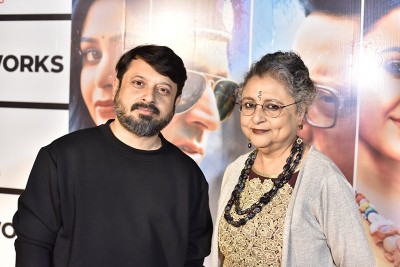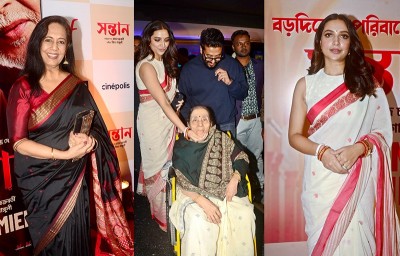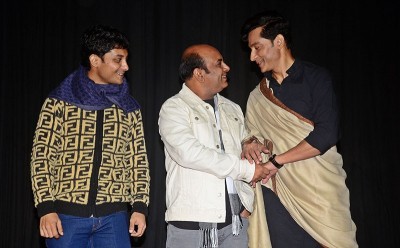 TIFF
TIFF
Laapataa Ladies is not a message film, but women issues are addressed intentionally: Kiran Rao
More than a decade after making her directorial debut with Dhobi Ghat (2010), Kiran Rao is back again as a director with 'Laapataa Ladies' (Lost Ladies), a satire set in rural India in 2001. Kiran Rao’s sophomore romp, which is also bankrolled by her ex-husband Aamir Khan as one of the producers, finds two young brides accidentally swapped, triggering a hilarious mistaken identities ride. Kiran Rao, along with creative producer Tanaji Dasgupta, speaks to IBNS Canada bureau chief Suman Das after the film's world premiere at the ongoing Toronto International Film Festival (TIFF)
Q. We see you as a director after 13 years since making an impressive debut with Dhobi Ghat in 2010. Did you take a conscious break from direction after your first film, or did you not find any good scripts to work on?
A: The break wasn't intentional; I didn't take a break. I was sort of a little lost, let's say, looking for the right script. I've been working on my own stories, building some series, and feature scripts, but none of them seemed quite right to make into a film. At the same time, I was doing my producing work. I've been working on Paani Foundation and raising my kid, so my life was very full. But in terms of finding the next film, I hadn't quite got what I wanted, until I heard the story of two brides, which was what pushed me through this story. And, when I heard that, I knew I had finally found my next film. It took some time to get us to acquire the script. Then Sneha (screenplay writer Sneha Desai) worked with me on the screenplay, and then it went into shooting last year. So it took its time. I didn't intend to vanish for 13 years.
Q. What was your experience like while working with Sneha Desai on her debut screenplay?
A: She is one of the most talented writers I've ever met and had the pleasure of working with. She comes from a background of Gujarati theatre, and has also worked a lot as an actor, and so she understands character from a very innate sort of point of view. Her dialogue, writing skills, thanks to theatre, are very sharp. Each scene is crafted very perfectly, you know. So, it was wonderful to work with her because she took (writer) Biplab Goswami's story and brought it to life with all the genuine, funny, eccentric, believable characters and a plot that keeps twisting and turning and taking you to unexpected destinations.
 Kiran Rao at TIFF. Image courtesy: Aamir Khan Productions
Kiran Rao at TIFF. Image courtesy: Aamir Khan Productions
Q. In an interview about this film you said: 'We’re Taking Apart Patriarchy Without a War’. So what inspired you to make this film? Is it because of the things in society that need to be answered?
A: The idea was to touch upon and explore all these issues. And open up conversations around education, women's rights, marriage, self worth and all kinds of things that we feel are important for us to engage with; ideas that we feel we want to open up. But we wanted to do it with a story that was engaging, funny, and had a sort of mass appeal at the same time, so that it's not necessarily a 'message' film. It's really all the issues that we touch upon. I explored the character through plot, you know, through characters' journeys and personal discoveries and observations. So, yes, it was very intentional to address all these issues.
Q. How do you think the audience sitting in 2023, would take the plot of this story set in 2001? How relevant is it to Indian society as of today?
A: I feel a lot of these issues (women's rights and education) are being tackled, but are not where we want them to be. Everything is not all fine when you look at many of these subjects, so I feel like it's relevant, when you look at it, when you pull out and you look at it in a broad way. There is a way to go. And I think lots of these things just need to be affirmed and restated and you know, in some way, reminded, oh, that we don't lose sight that this is what we really hope for as a society.
 Image courtesy: Aamir Khan Productions
Image courtesy: Aamir Khan Productions
Q. Tell us about your casting experience for this film.
A: When we heard the story, and when we developed the script, we knew that the story itself is so honest, so genuine, so real, and believable, that we wanted actors who fit it and you would associate them with these characters, and that they would bring something of themselves genuinely to them. So, the idea was not to have a star cast where you already have some expectations of those faces. Instead, we wanted more fresh faces and also characters who felt they belonged very much to that world. So we had a casting director called Romil, who sort of went out there and really searched far and wide in the world of theatre, television, ad film, the ones who appear in commercials, some of them are non actors. So Romil understood the kind of tone and the look that we wanted for this film. We had then the job of sort of auditioning a lot of people and we laid it down to the right person for the right role. It was an extensive audition process and, you know, sort of callbacks, and we tested groups of actors together so that we could tell what they would do and how they would work together.
Q. The entire movie has been a social comedy, but speaks about the underlying truth of Indian society. Do you expect any cuts from the Central Board of Film Certification?
A: We don't anticipate any, any of that, though we haven't yet applied to the censor board. We will now, as we've got a release date of the film, which is 5th of January 2024. So we will be applying to the censor board, but we don't anticipate that there will be any cuts because the film is a comedy, it's a satire, coming from a very genuine place. And it's very inclusive and accepting of all kinds of people and all ideas and thoughts. So I don't see you'd find anything objectionable.
 Kiran Rao presents her film at TIFF. Image courtesy: Suman Das
Kiran Rao presents her film at TIFF. Image courtesy: Suman Das
Q. What other festivals apart from TIFF are you taking the movie?
A: This is our very first world premiere (at TIFF), we've not been anywhere else. And we don't intend to actually go to any more festivals. The idea is to go directly to cinemas now. So work now is carved out for us in the next three months of building the marketing and distribution plan and going to the people and we are hoping that people will award us with a big box office and with their love, because we really made this film for theatrical release and for distribution. We didn't make it necessary for the sort of niche festivals or OTTs; we wanted it to be broad; we wanted it for the public, and it's really made to entertain the crowd at large.
Q: (To creative producer Tanaji Dasgupta) How did you come to work on this film with Kiran Rao?
A: I got a phone call from Kiran. I just finished 'The Disciple', which was also played at TIFF in 2020. I had known Kiran socially, as we had a few common friends. So it's always a case of 'the right phone call at the right time'. I was a fan of her first film and in the first meeting itself, she told me about this story. On hearing my eyes lit up because I'd actually seen Biplab pitch the story at the screenplay competition where Aamir was the judge and he won the runner-up prize. Out of all those pitches, I only remembered this one because it was just such a cool, interesting premise. I come from quite an independent, mostly art-house kind of background, so I was extremely excited to do comedy and a feel good film.
Support Our Journalism
We cannot do without you.. your contribution supports unbiased journalism
IBNS is not driven by any ism- not wokeism, not racism, not skewed secularism, not hyper right-wing or left liberal ideals, nor by any hardline religious beliefs or hyper nationalism. We want to serve you good old objective news, as they are. We do not judge or preach. We let people decide for themselves. We only try to present factual and well-sourced news.







